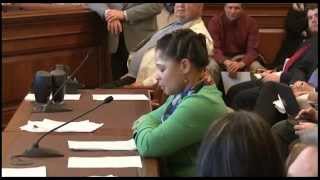
– Video screencap from Progress Missouri
By TIM ROWDEN
Editor
Jefferson City – Two Republican-sponsored, anti-worker, union-busting bills received a mixed vote from a Missouri Senate panel prior to the Legislature’s spring break.
So-called right-to-work legislation, which would make it illegal for unions to negotiate contracts wherein everyone covered by that contract has to contribute to its negotiation and enforcement, was sent to the full Senate.
But the Senate Small Business, Insurance and Industry Committee failed to move forward on a “paycheck deception” measure (what supporters deceptively call “paycheck protection”) to require annual written authorization from public employee union members for collection of union dues. The measure – designed to create a bureaucratic bottleneck for unions – is a back door way of achieving the same union-busting objectives of right-to-work.
Sen. Wayne Wallingford (R-Cape Girardeau) voted for the right-to-work bill but against the paycheck deception measure.
Wallingford told the Associated Press he hadn’t decided whether he would vote for right-to-work on the floor but wanted to hear supporters’ claims of job creation and union members’ assertion that right-to-work lowers wages debated.
“I don’t want one or the other,” Wallingford said. “I want economic development and higher wages and a strong middle class.”
Wallingford said he voted against the “paycheck” because it did nothing to create jobs and was more about attacking unions.
“It didn’t add one more job to Missouri,” Wallingford said.
WORKERS SPEAK OUT
During the committee hearing, UFCW members Teressa Hester (Shop ‘n Save) and Laurie Giannini (Schnucks) gave powerful testimony against right-to-work.
Hester told senators how finding a union job with good pay and benefits had helped her get off of public assistance, provide a stable home for her daughter and buy her own house – all things that would be threatened if Missouri passes right-to-work.
“This bill is confusing,” Hester said. “It’s complicated and deceitful. This will hurt working families across the board. We really shouldn’t be here talking about right-to-work. We should be here talking about creating jobs, increasing the minimum wage and investing in education and infrastructure. We shouldn’t be here talking about right-to-work.
“I sleep better at night knowing that I have great benefits, better working conditions, great health care and a voice that someone will hear,” Hester said. “UFCW has made that possible.”
Giannini told the story of how as a single mother she was fired from her job as an administrative assistant for a real estate company because a new saleswoman didn’t like her and she had no union to protect her from being unfairly dismissed.
“My life changed dramatically at that point because I had no other recourse,” Giannini said. “I had no representation, nobody to go to. I had no union.
“I’m not a politician,” Giannini said. “I’m not a lobbyist. I’m a worker. I’m represented by a union of workers. That’s how I see it.”
TWO VERSIONS OF RTW
The Senate’s right-to-work bill is not the House version. That House bill (HB 116) was passed by the Missouri House on a 91-64 vote, short of the 109 votes needed to override a potential veto by Gov. Jay Nixon and has yet to be heard by Senate committee.
Senate President Pro Tem Tom Dempsey (R-St. Charles) said he had not decided how he would vote on a right-to-work bill but that he would not stop it from coming to the floor for a vote.
Both “paycheck” and right-to-work face strong opposition from Senate Democrats.

